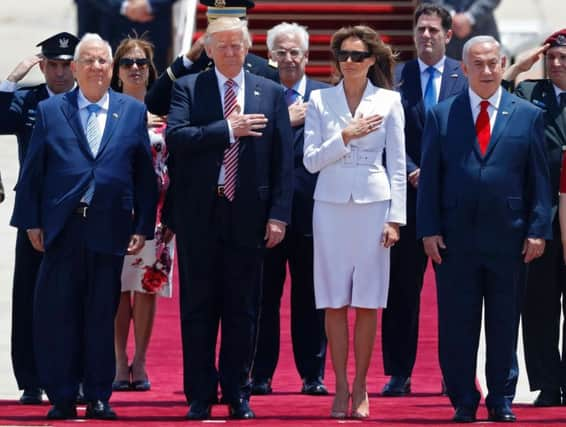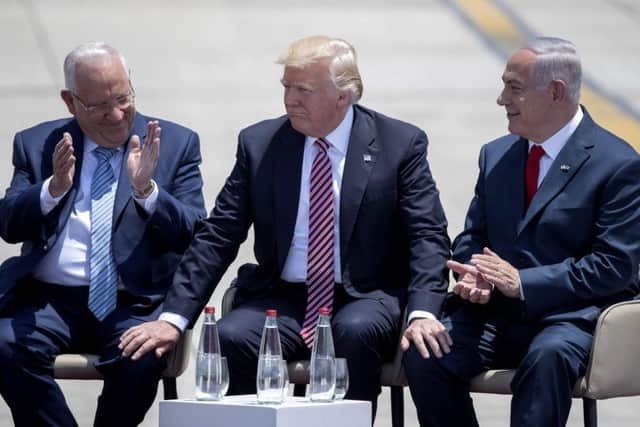Donald Trump denies mentioning Israel in meeting with Russians


US president Donald Trump said he never mentioned “the word or the name Israel” during a recent conversation with top Russian diplomats.
Speaking alongside Israel’s prime minister Benjamin Netanyahu, Mr Trump was referencing revelations that he divulged classified information about an Islamic State threat during a recent meeting in Washington with Russia’s foreign minister and ambassador.
US officials said the information originated from Israel.
Advertisement
Hide AdAdvertisement
Hide Ad

Mr Trump, who is making his first visit to Israel as US president, said: “I never mentioned the word or the name Israel in that conversation.”
Mr Netanyahu added that US-Israeli intelligence co-operation is “terrific”.
Mr Trump said the story is another one the news media has got wrong.
The president’s first stop was a meeting in Jerusalem with Israeli president Reuven Rivlin.


In a statement following the meeting, Mr Trump addressed his meetings the previous day with Arab and Muslim leaders in Saudi Arabia, and said that there is growing realisation that they share a goal with Israel in their determination to defeat extremism and deter “the threat posed by Iran”.
Mr Netanyahu called Mr Trump “a true friend” to Israel and expressed optimism about the president’s role in the Middle East peace process. But obstacles have emerged that may complicate the relationship between the White House and the Israel.
Mr Trump, wearing a black skullcap, yesterday became the first sitting president to visit the Western Wall.
Mr Trump touched it in prayer and, adhering to tradition, placed a note in a deep crevice.
Advertisement
Hide AdAdvertisement
Hide AdHe also toured the Church of the Holy Sepulchre, which by Christian tradition is where Jesus was crucified and the location of his tomb.
Today, he is set to meet Palestinian lead Mahmoud Abbas in the West Bank and deliver a speech at the Israeli Museum.
But Mr Trump may face concerns from Israelis over the new $110 billion arms deal he announced during his stop in Saudi Arabia as well as questions from Israeli officials about the revelations that he disclosed sensitive Israeli intelligence to Russian officials.
US Secretary of State Rex Tillerson, speaking to reporters on board Air Force One, said the US could provide clarifications to Israel about the disclosure but said: “I don’t know that there’s anything to apologise for.”
White House aides have also tried to play down expectations for significant progress on the peace process during Mr Trump’s stop, casting the visit as symbolic.
Mr Tillerson referred to the visit as “a moment in time” and suggested that the US would take a more active role in the future in brokering a deal if both sides make serious commitments.
Mr Trump, whose unorthodox approach has spurred some hope on both sides of the Israeli-Palestinian conflict, has done no such managing of expectations.
He boldly stated that achieving peace is “something that I think is, frankly, maybe not as difficult as people have thought over the years” in March during a meeting with Mr Abbas.
Advertisement
Hide AdAdvertisement
Hide Ad“But we need two willing parties,” he said then. “We believe Israel is willing. We believe you’re willing. And if you both are willing, we’re going to make a deal.”
And Mr Trump made one symbolic gesture yesterday in bridging the gap between Israel and the Arab world. His flight on Air Force One was believed to be the first direct flight between Saudi Arabia and Israel, nations that have limited diplomatic relations.
Mr Netanyahu said he hoped an Israeli prime minister could soon make the same flight.